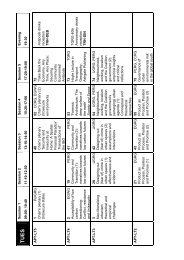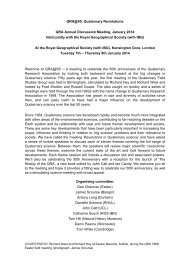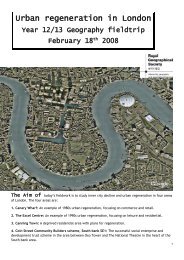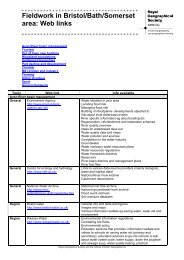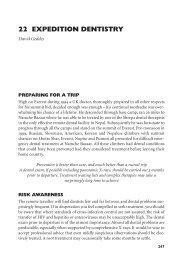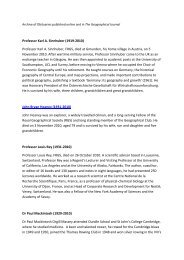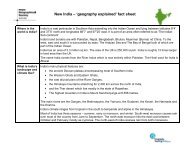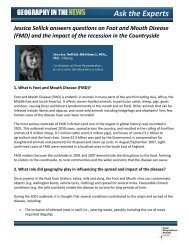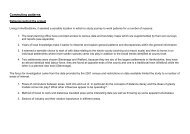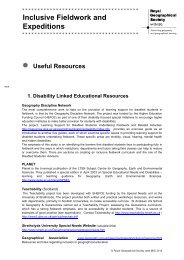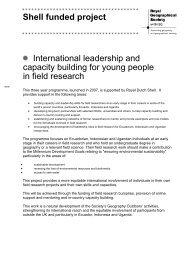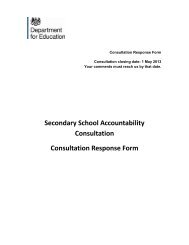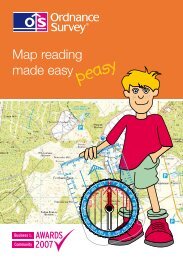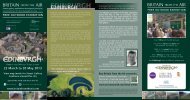Urban regeneration in Bristol Harbourside - Royal Geographical ...
Urban regeneration in Bristol Harbourside - Royal Geographical ...
Urban regeneration in Bristol Harbourside - Royal Geographical ...
You also want an ePaper? Increase the reach of your titles
YUMPU automatically turns print PDFs into web optimized ePapers that Google loves.
<strong>Urban</strong> <strong>regeneration</strong> <strong>in</strong> <strong>Bristol</strong> <strong>Harbourside</strong><br />
About the unit<br />
In this unit pupils <strong>in</strong>vestigate the impact of change <strong>in</strong> trade, economic activity and land use<br />
on <strong>Bristol</strong> harbourside, via a days fieldwork <strong>in</strong> the Float<strong>in</strong>g Harbour area of the City.<br />
Pupils can beg<strong>in</strong> to understand better how economic experiences affect communities <strong>in</strong> their<br />
local area, help<strong>in</strong>g to deepen their own geographical understand<strong>in</strong>g. This contributes to key<br />
stage 3 citizenship education.<br />
The unit focuses on <strong>Bristol</strong> Float<strong>in</strong>g Harbour and the change <strong>in</strong> land use that has occurred<br />
there due to the decl<strong>in</strong>e of the Atlantic slave trade and the movement of trade to other British<br />
ports. The ideas can be transferred to a study of any area that has suffered<br />
recession/decl<strong>in</strong>e, eg cotton manufacture, shipbuild<strong>in</strong>g, coal m<strong>in</strong><strong>in</strong>g.<br />
Pupils should be encouraged to use OS maps to identify their study area and select sites for<br />
surveys and further <strong>in</strong>vestigation. They should also look closely at further development plans<br />
and th<strong>in</strong>k about the potential impacts these may have on the local community.<br />
Key aspects<br />
<strong>Geographical</strong> enquiry and skills<br />
Pupils will:<br />
• ask geographical questions<br />
• suggest sequences of <strong>in</strong>vestigation<br />
• collect/record/present evidence<br />
• analyse evidence and draw conclusions<br />
• appreciate values and attitudes<br />
• communicate appropriately<br />
• use atlases/globes/maps<br />
• use secondary evidence<br />
• draw maps, plans and graphs<br />
• communicate, <strong>in</strong>clud<strong>in</strong>g us<strong>in</strong>g ICT<br />
• experience decision mak<strong>in</strong>g<br />
Knowledge and understand<strong>in</strong>g of places<br />
Pupils will:<br />
• locate places<br />
• understand about change <strong>in</strong> their local area<br />
• <strong>in</strong>vestigate change <strong>in</strong> places<br />
• explore <strong>in</strong>terdependence and global citizenship<br />
Knowledge and understand<strong>in</strong>g of patterns and processes<br />
Explored through:<br />
• Economic activity<br />
• Tourism<br />
• Regeneration<br />
• Fieldwork<br />
Knowledge and understand<strong>in</strong>g of environmental change and susta<strong>in</strong>able development<br />
• Environmental impacts of land use change<br />
• Susta<strong>in</strong>able cities and susta<strong>in</strong>able tourism



